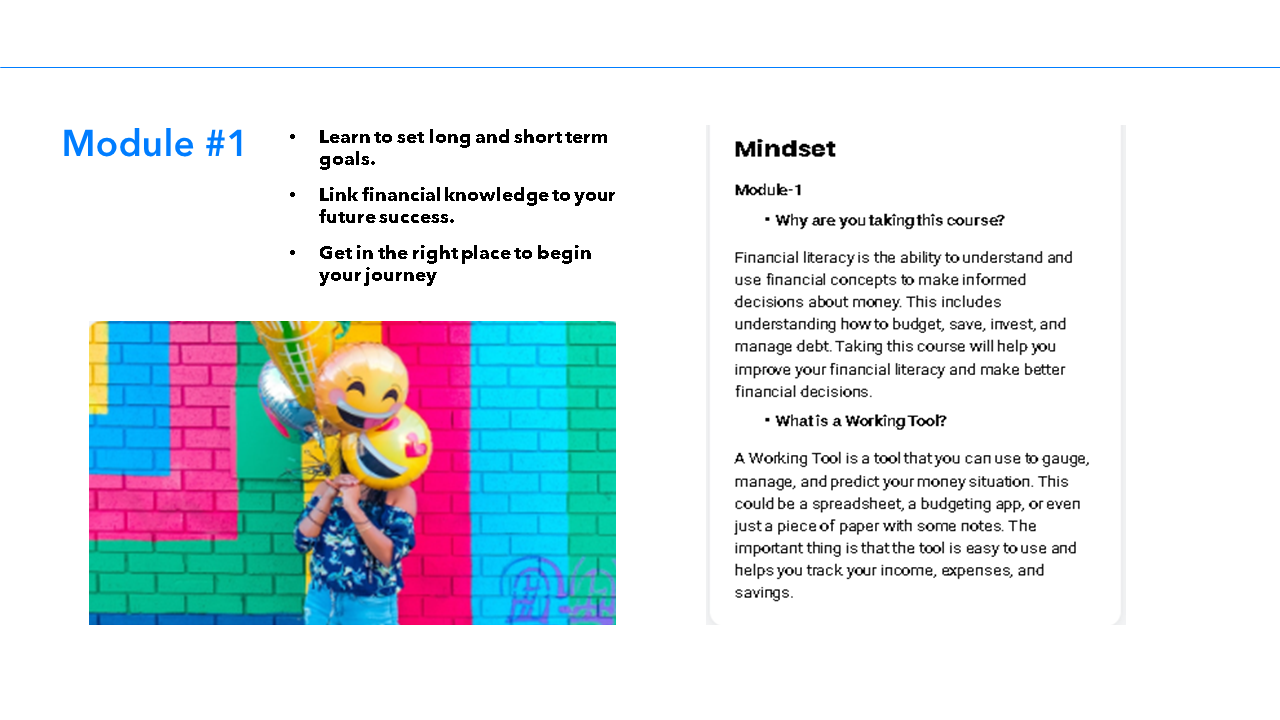
Personal Financial Literacy Course BETA review of module #1 (18 total modules inside 6 chapters)
By: Julius E. Guerra
August 14, 2023 3:07 PM / 0 Comments
Mindset plays a crucial role when starting any endeavor, including learning and completing tasks related to financial literacy.
Mindset plays a crucial role when starting any endeavor, including learning and completing tasks related to financial literacy. Your mindset shapes your attitude, perspective, and approach toward the task at hand. Let's explore why mindset is important using financial literacy as an example:
1. **Openness to Learning:** A growth mindset, which involves believing that abilities and intelligence can be developed through effort and learning, is essential when tackling financial literacy. If you approach financial education with a growth mindset, you're more likely to embrace challenges, seek out new information, and persist in the face of setbacks. This mindset encourages you to view mistakes as learning opportunities rather than failures.
2. **Resilience in the Face of Challenges:** Financial literacy can involve complex concepts that might be initially difficult to understand. A positive and resilient mindset helps you navigate through these challenges without becoming discouraged. Instead of giving up, you'll approach difficulties as temporary obstacles that can be overcome with dedication and effort.
3. **Adaptability to Change:** The financial landscape is constantly evolving, with new technologies, investment options, and regulations emerging regularly. A mindset that values adaptability and continuous learning allows you to stay current and adjust your financial strategies as needed.
4. **Embracing Risk and Uncertainty:** Financial decisions often involve an element of risk. A healthy mindset enables you to assess risks and make informed choices rather than avoiding them out of fear. It helps you understand that calculated risks can lead to rewards and growth.
5. **Long-Term Thinking:** Financial literacy often involves planning for the long term, whether it's saving for retirement, investing in assets, or managing debt. A forward-thinking mindset helps you make decisions that align with your long-term goals, even if they require short-term sacrifices.
6. **Ownership of Financial Well-being:** A proactive mindset empowers you to take ownership of your financial well-being. Instead of relying solely on others for advice, you'll seek out information, educate yourself, and make informed decisions based on your individual circumstances.
7. **Positive Attitude Toward Budgeting:** Budgeting is a fundamental aspect of financial literacy. A positive mindset turns budgeting from a restrictive chore into a tool that empowers you to allocate resources wisely and achieve your financial aspirations.
8. **Overcoming Limiting Beliefs:** Negative beliefs about money, such as "I'm not good with numbers" or "Investing is too risky," can hinder your progress. Cultivating a positive mindset helps you challenge and overcome these limiting beliefs, enabling you to explore new opportunities and expand your financial knowledge.
9. **Seeking Opportunities:** A mindset geared toward seeking opportunities encourages you to explore various avenues for growing your financial resources. Whether it's exploring new investment options, pursuing additional income streams, or seeking out financial advice, this mindset drives you to discover ways to improve your financial situation.
